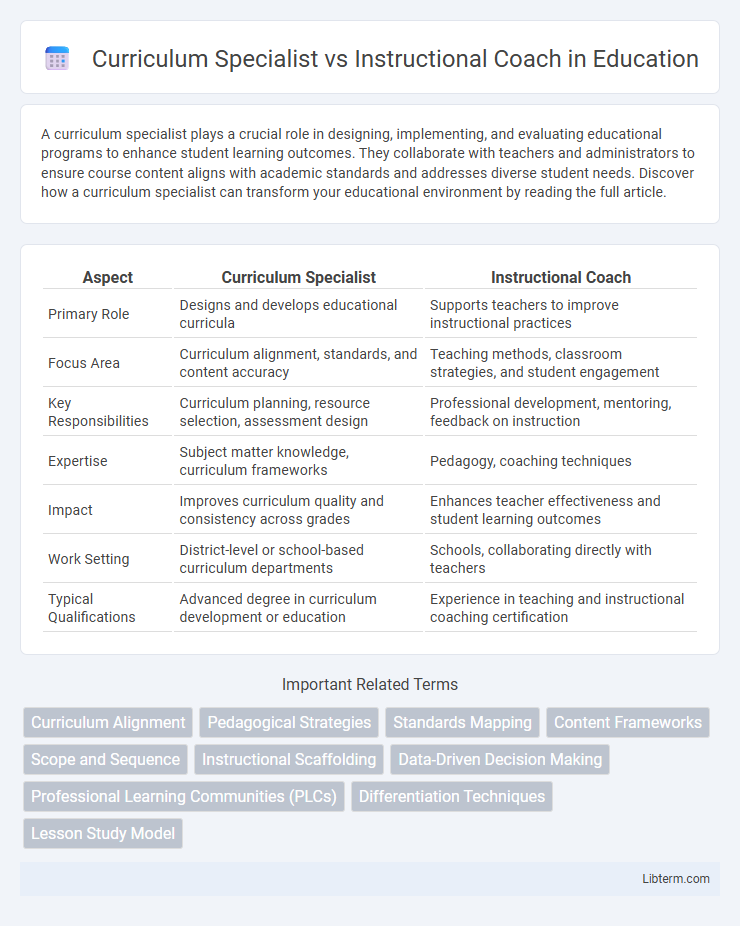A curriculum specialist plays a crucial role in designing, implementing, and evaluating educational programs to enhance student learning outcomes. They collaborate with teachers and administrators to ensure course content aligns with academic standards and addresses diverse student needs. Discover how a curriculum specialist can transform your educational environment by reading the full article.
Table of Comparison
| Aspect | Curriculum Specialist | Instructional Coach |
|---|---|---|
| Primary Role | Designs and develops educational curricula | Supports teachers to improve instructional practices |
| Focus Area | Curriculum alignment, standards, and content accuracy | Teaching methods, classroom strategies, and student engagement |
| Key Responsibilities | Curriculum planning, resource selection, assessment design | Professional development, mentoring, feedback on instruction |
| Expertise | Subject matter knowledge, curriculum frameworks | Pedagogy, coaching techniques |
| Impact | Improves curriculum quality and consistency across grades | Enhances teacher effectiveness and student learning outcomes |
| Work Setting | District-level or school-based curriculum departments | Schools, collaborating directly with teachers |
| Typical Qualifications | Advanced degree in curriculum development or education | Experience in teaching and instructional coaching certification |
Introduction to Curriculum Specialists and Instructional Coaches
Curriculum Specialists design and develop educational materials aligned with academic standards to ensure effective teaching and learning. Instructional Coaches provide personalized support and mentorship to educators, enhancing instructional strategies and classroom performance. Both roles play critical parts in improving student outcomes by focusing on curriculum development and teacher growth, respectively.
Defining the Roles: Curriculum Specialist vs Instructional Coach
Curriculum Specialists design, evaluate, and implement educational content and standards to ensure alignment with academic goals and state requirements, focusing on curriculum development and assessment strategies. Instructional Coaches support teachers by modeling instructional techniques, providing feedback, and fostering professional growth to enhance classroom teaching practices and student engagement. Both roles collaborate with educators but differ in scope, with Curriculum Specialists shaping the framework of what is taught and Instructional Coaches improving how it is delivered.
Key Responsibilities and Duties
A Curriculum Specialist develops, evaluates, and revises academic programs to align with educational standards and improve student learning outcomes. An Instructional Coach provides personalized support to teachers through observation, feedback, and professional development to enhance classroom instruction and student engagement. Both roles collaborate with educators but differ in focus: curriculum design for specialists versus hands-on teaching strategies for coaches.
Required Qualifications and Backgrounds
Curriculum Specialists typically require a master's degree in education or curriculum development, along with extensive experience in curriculum design and assessment strategies. Instructional Coaches often hold advanced degrees in education or educational leadership and have a background as classroom teachers with proven expertise in instructional methodologies and teacher mentoring. Both roles benefit from strong communication skills and professional development certifications, but Curriculum Specialists focus more on content alignment, whereas Instructional Coaches emphasize instructional improvement and teacher support.
Skills and Competencies for Success
Curriculum Specialists excel in skills such as curriculum design, content alignment with standards, and data analysis to improve instructional materials, ensuring educational coherence across grade levels. Instructional Coaches possess strong competencies in adult learning theory, personalized teacher support, and effective communication to foster impactful classroom strategies and professional growth. Both roles require a deep understanding of pedagogy, collaboration, and assessment techniques to drive student achievement and teacher effectiveness.
Impact on Student Learning and Achievement
Curriculum Specialists design and evaluate educational content to align with standards, ensuring coherence and rigor that directly supports student learning outcomes. Instructional Coaches work closely with teachers to implement effective teaching strategies and improve classroom practices, leading to enhanced student engagement and academic performance. Both roles contribute significantly to student achievement by fostering a strong instructional framework and promoting evidence-based pedagogy.
Collaboration with Teachers and School Leaders
Curriculum Specialists collaborate closely with teachers and school leaders to design, evaluate, and refine curriculum frameworks ensuring alignment with academic standards and student learning goals. Instructional Coaches work side-by-side with educators to model effective teaching strategies, provide personalized feedback, and foster professional growth through collaborative reflection and goal-setting. Both roles emphasize strong partnerships that promote cohesive instructional practices and support continuous school-wide improvement.
Differences in Daily Work Environments
Curriculum Specialists primarily focus on designing, evaluating, and updating educational programs, working closely with teachers, administrators, and content experts to ensure alignment with standards and learning goals. Instructional Coaches engage directly with teachers in classroom settings, providing real-time feedback, modeling teaching strategies, and supporting professional development to enhance instructional practices. While Curriculum Specialists often operate within administrative or planning environments, Instructional Coaches spend more time in dynamic, hands-on interactions in schools.
Career Growth and Advancement Opportunities
Curriculum Specialists often advance into roles such as Academic Directors or Education Program Managers, leveraging expertise in designing and evaluating educational content to influence school-wide or district-wide curriculum policies. Instructional Coaches typically progress toward positions like Lead Instructional Coach or Professional Development Coordinator, utilizing hands-on teaching strategies to improve educator performance and student outcomes. Both career paths offer leadership opportunities but differ in focus, with Curriculum Specialists emphasizing content development and Instructional Coaches focusing on teacher support and instructional improvement.
Choosing the Right Path: Which Role Fits You?
Choosing between a Curriculum Specialist and an Instructional Coach depends on your passion for designing educational content versus supporting teachers in implementing effective strategies. Curriculum Specialists focus on developing, revising, and aligning curriculum materials with standards, while Instructional Coaches concentrate on mentoring educators to enhance classroom practices and student outcomes. Assess your strengths in curriculum development or personalized teacher support to determine the best fit for your professional goals.
Curriculum Specialist Infographic

 libterm.com
libterm.com